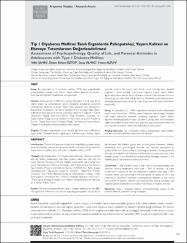| dc.contributor.author | Şahin, Nilfer | |
| dc.contributor.author | Öztop, Didem Behice | |
| dc.contributor.author | Yılmaz, Savaş | |
| dc.contributor.author | Altun, Hatice | |
| dc.date.accessioned | 2020-11-20T17:21:41Z | |
| dc.date.available | 2020-11-20T17:21:41Z | |
| dc.date.issued | 2015 | |
| dc.identifier.issn | 1309-4866 | |
| dc.identifier.issn | 1309-4866 | |
| dc.identifier.uri | https://app.trdizin.gov.tr//makale/TVRrMk5ERTNOdz09 | |
| dc.identifier.uri | https://hdl.handle.net/20.500.12809/7141 | |
| dc.identifier.uri | https://doi.org/10.5152/npa.2015.7248 | |
| dc.description.abstract | Amaç: Bu çalışmada tip 1 diyabetes mellitus (DM) tanılı ergenlerdeki psikopatolojiyi, ebeveyn tutumlarını, yaşam kalitesi algılarını ve bunların birbiriyle olan ilişkilerini belirlemek amaçlanmıştır. Yöntem: Çalışmaya tip 1 DM tanısı konan 50 ergen (12-18 yaş) ile 50 sağlıklı ergen ve anne-babaları alındı. Diyabetik ergenlerle psikiyatrik rahatsızlıkları taramak amacıyla "Okul Çağı Çocukları için Duygulanım Bozuklukları ve Şizofreni Görüşme Çizelgesi-Şimdi ve Yaşam Boyu Şekli" kullanılarak klinik görüşme yapıldı. Çalışmaya katılan tüm ergenlerin Çocuk Depresyon Ölçeği, Durumluk-Sürekli Kaygı Envanteri, Çocuklar için Yaşam Kalitesi Ölçeği ve anne-babalarının Aile Hayatı ve Çocuk Yetiştirme Tutumu Ölçeği, Başa Çıkma Stratejisi Ölçeği, Çocuklar için Yaşam Kalitesi Ölçeği'nin anne baba formunu doldurmaları istendi. Bulgular: Diyabetli ergenlerde ruhsal hastalık görülme oranı %68 olarak tespit edildi. Diyabetli grupla sağlıklı grup arasında yaşam kalitesi algıları açısından anlamlı fark bulunmadı. Ancak ruhsal hastalığı olan diyabetli ergenlerin ruhsal hastalığı bulunmayan olgulara kıyasla yaşam kalitesi algıları daha düşük olarak izlendi. Ebeveyn tutumlarından otoriter tutumun diyabetli grupta daha fazla olduğu bulundu. Diyabetik grupta ebeveynlerin anksiyeteyle başa çıkma yöntemlerinden kaçınmayı daha fazla kullandıkları tespit edildi. Sonuç: Bu çalışmada Tip 1 DM'li ergenlerde yüksek oranda psikopatoloji saptanmıştır. Ayrıca tip 1 DM'de yaşam kalitesinin bozulmadığı, diyabete eşlik eden psikiyatrik bozukluk varlığında ergenlerin yaşam kalitesi algılarının kötüleştiği bulunmuştur. Diyabetik çocuğu olan anne-babaların sağlıklı kontrollere kıyasla strese karşı uygunsuz başa çıkma yöntemlerini ve olumsuz aile tutumlarını daha fazla kullandıkları saptanmıştır. | en_US |
| dc.description.abstract | Introduction: The aim of the present study was to identify psychopathology, parental attitudes, perceptions of quality of life, and relationships between these factors in adolescents with type 1 diabetes mellitus (DM). Methods: Fifty adolescents (12-18 years old) with type 1 diabetes mellitus and 50 healthy adolescents and their parents were recruited for the study. Clinical interviews with the diabetic adolescents were performed using " Schedule for Affective Disorders and Schizophrenia for SchoolAge Children-Present and Lifetime Version (K-SADS-PL)." Both groups completed the " Depression Scale for Children," " State-Trait Anxiety Inventory," and " Health Related Quality of Life Scale for Children," while their parents completed the " Parental Attitude Research Instrument," " The Coping Strategy Indicator," and " Health Related Quality of Life Scale for Children-Parent Form." Results: The psychological disorder ratio in diabetic adolescents was 68%. No significant difference was found regarding perceptions of quality of life between the diabetic group and control group. However, diabetic adolescents with psychological disorder had reduced perception of quality of life than those without psychological disorder. Among parental attitudes, an authoritarian attitude was found to be more common in the diabetic group. It was found that among coping strategies, parents in the diabetic group use avoidance more commonly. Conclusion: In the present study, a high rate of psychopathology was detected among adolescents with type 1 DM. In addition, no clear impairment in quality of life was reported in patients with type 1 DM; however, there was worsening in the perception of quality of life in the presence of psychiatric disorders accompanying diabetes. It was found that parents of diabetic children use inappropriate coping strategies and negative parental attitudes more often than those of healthy controls. | en_US |
| dc.item-language.iso | tur | en_US |
| dc.item-rights | info:eu-repo/semantics/openAccess | en_US |
| dc.subject | Nörolojik Bilimler | en_US |
| dc.subject | Psikiyatri | en_US |
| dc.title | Tip 1 Diyabetes Mellitus Tanılı Ergenlerde Psikopatoloji, Yaşam Kalitesi ve Ebeveyn Tutumlarının Değerlendirilmesi | en_US |
| dc.item-title.alternative | Assessment of Psychopathology, Quality of Life, and Parental Attitudes in Adolescents with Type 1 Diabetes Mellitus | en_US |
| dc.item-type | article | en_US |
| dc.contributor.department | MÜ, Tıp Fakültesi, Dahili Tıp Bilimleri Bölümü | en_US |
| dc.contributor.institutionauthor | Şahin, Nilfer | |
| dc.identifier.volume | 52 | en_US |
| dc.identifier.issue | 2 | en_US |
| dc.identifier.startpage | 133 | en_US |
| dc.identifier.endpage | 138 | en_US |
| dc.relation.journal | Nöropsikiyatri Arşivi | en_US |
| dc.relation.publicationcategory | Makale - Ulusal Hakemli Dergi - Kurum Öğretim Eleman | en_US |


















